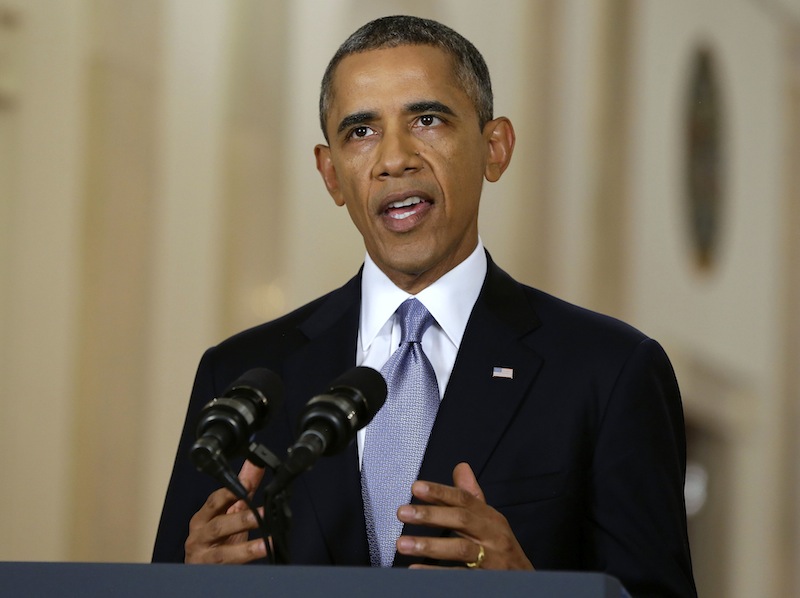In his prime time speech to the nation Tuesday night, President Barack Obama underscored the fact that U.S. military action against Syria remains on the table. He argued that the threat of force has led to the possibility of an effective diplomatic response to the regime’s alleged use of chemical weapons on Aug. 21 that by U.S. estimates killed more than 1,000 people.
“Our ideals and principles as well as our national security are at stake in Syria,” he said from the White House East Room. “America is not the world’s policeman. Terrible things happen across the globe. And it is beyond our means to right every wrong. But when with modest effort and risk, we can stop children from being gassed to death, and thereby make our own children safer over the long run, I believe we should act. That’s what makes America different. That’s what makes us exceptional. With humility but with resolve, let us never lose sight of that essential truth.”
“I have a deeply held preference for peaceful solutions,” Obama said, saying a diplomatic resolution being brokered by Russia with U.N. involvement “has the potential to remove the threat of chemical weapons without the use of force.”
He said he has asked Congress to postpone a vote on military action while the U.S., Syria and Russia negotiate a resolution that requires the Assad regime to surrender its chemical weapons to the United Nations and eventually destroy them under international supervision. He called it an “encouraging sign” but said that it’s “too early to tell whether this offer will succeed, and any agreement must verify that the Assad regime keeps its commitments.”
Obama’s speech comes one day after a diplomatic route to resolving the crisis emerged, almost from nowhere, at the same time that it became clear that the White House lacked the votes in Congress to win approval for the use of force. Senators pushing for military action broadly agree that the threat of force must remain in order for the negotiation to succeed, but appear willing to give the administration time and space to work through diplomatic channels, especially since there are still not a majority of senators willing to authorize force. Meanwhile, Russian leader Vladimir Putin is calling unacceptable any U.N. resolution that is explicitly enforceable through the use of U.S. force.
If the diplomatic solution fails, Obama reiterated the need for limited, targeted military action to damage the Assad regime’s ability to deploy chemical weapons. He posed and answered what he described as the most common questions he’s been asked about the conflict and addressed his critics on the right and left, promising that he “will not put American boots on the ground in Syria,” while also arguing that action will “make our own children safer over the long run.”
The President invoked graphic imagery of “men, women, children, lying in rows killed by poison gas. Others foaming at the mouth, gasping for breath.” He admitted that any military action “is not going to be popular” after the wars in Iraq and Afghanistan. “After all, I’ve spent four and a half years working to end wars, not to start them,” he said.
“If we fail to act,” he said, “the Assad regime will see no reason to stop using chemical weapons. As the ban against these weapons erodes, other tyrants will have no reason to think twice about acquiring poison gas and using them.”






